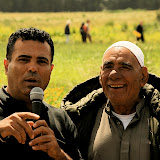So writes Jeff Halper in his recent book An Israeli in Palestine (for more on Jeff's organization, Israeli Committee Against House Demolitions, visit here). Nishul, or dispossession, is an operative part of what is happening here in Israel/Palestine. An exclusive national claim, that the Land of Israel, in its largest geographic sense, is for Jews only. Any other people group cannot be allowed to have a claim to live in this Jewish-only space. This process claims that the land must be redeemed through being settled by Jews, and Jews alone. Much of what happened in May 1948, al-Nakba for the Palestinians, and Independence Day for Israelis, stems from the process of nishul. Much of what is done in the Occupied Territories (West Bank and Gaza) and Israel proper today is part of the same process.
In 1948 many Palestinians were driven from their homes through violence or the fear of violence. Some Palestinians left voluntarily at the behest of surrounding Arab governments with promises of a quick victory over the newly formed 'Zionist entity', but there were plenty of Palestinians who would have chosen to remain in their villages but were forced out by Israeli militia or military. MCC workers here in Israel/Palestine recently visited one such village, Simsim, which means 'sesame seed' in Arabic. We visited this village with MCC's partner in Tel Aviv, Zochrot, which is an Israeli organization that does advocacy and tries to raise awareness among the Israeli population about the events of 1948.
As part of their advocacy, Zochrot tours Palestinian villages that
 were destroyed or whose residents were expelled in 1948. Lots of international visitors usually join the tours, as well as many Israeli citizens. Usually Zochrot is able to find some of the orginial inhabitants of the village. For this tour they brought with them a man who was 10 years old when he was forced from his home. He brought with him his sons and grandchildren, and led us on a tour of
were destroyed or whose residents were expelled in 1948. Lots of international visitors usually join the tours, as well as many Israeli citizens. Usually Zochrot is able to find some of the orginial inhabitants of the village. For this tour they brought with them a man who was 10 years old when he was forced from his home. He brought with him his sons and grandchildren, and led us on a tour of Simsim. We saw where the town well used to be, the town cemetery, the mosque, and the remains of some of the homes in the village. A photo essay (below) documents our visit and reveals how impactful such visits can be; we were able to watch as his children and grandchildren showed us land that used to belong to their grandfather, or the village square where a travelling circus used to perform once a year.
Simsim. We saw where the town well used to be, the town cemetery, the mosque, and the remains of some of the homes in the village. A photo essay (below) documents our visit and reveals how impactful such visits can be; we were able to watch as his children and grandchildren showed us land that used to belong to their grandfather, or the village square where a travelling circus used to perform once a year.As part of their advocacy, Zochrot brings signs in Arabic and Hebrew identifying the remains of the buildings. Below is the sign that marks the village's well. The man's grandson nailed the sign to the remains of the well.
 With each swing of the hammer, even in a small way, he affirms that not everyone will participate in nishul, in the dispossession of the land from some of its residents. Palestinians were there to witness that this land used to belong to someone; internationals, among them MCC workers, were there to witness that this used to be a Palestinian village; Israelis were there to testify to the fact that not all of Israel is willing to participate in the process of dispossession and that there are Israeli Jews who today are willing to participate in a genuine process of redeeming the land, of living together with all the land's residents in peace and justice.
With each swing of the hammer, even in a small way, he affirms that not everyone will participate in nishul, in the dispossession of the land from some of its residents. Palestinians were there to witness that this land used to belong to someone; internationals, among them MCC workers, were there to witness that this used to be a Palestinian village; Israelis were there to testify to the fact that not all of Israel is willing to participate in the process of dispossession and that there are Israeli Jews who today are willing to participate in a genuine process of redeeming the land, of living together with all the land's residents in peace and justice. |
| Visit to SimSim |
